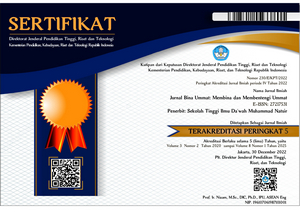THE DAWAH STRATEGY OF PROPHET MUHAMMAD IN THE DEVELOPMENT OF THE MADINAH COMMUNITY
DOI:
https://doi.org/10.38214/jurnalbinaummatstidnatsir.v6i2.199Keywords:
da’wah, Development, Madinah, StrategyAbstract
The Prophet Muhammad had succeeded in changing the land of Yathrib, with its bad connotation of population and civilization, into Medina as a developed country, which brought about rapid changes. The influence of this society reached areas occupied by the Persian and Roman civilizations for hundreds of years. All were stunned by the speed with which Islam built a superior new society, and all of its dimensions were firmly rooted in faith. The concept of the Medina Community has become proof that the source of knowledge, the source of civilization, and the superpower society originate in this city. This success indicates the intelligence of the da'wah strategy that the Prophet carried out. This paper uses a qualitative research type of literature study. The results of this paper prove that there are several main strategies that the prophet used in building the Medina Society. This is also in line with the concept of developing modern society from a contemporary perspective.
Downloads
Published
Versions
- 2023-12-31 (2)
- 2023-12-31 (1)
Issue
Section
License
This work is licensed under a Lisensi Creative Commons Atribusi 4.0 Internasional.
Authors who publish with this journal agree to the following terms:
- Authors retain copyright and grant the journal right of first publication with the work simultaneously licensed under a Creative Commons Attribution License that allows others to share the work with an acknowledgment of the work's authorship and initial publication in this journal.
- Authors are able to enter into separate, additional contractual arrangements for the non-exclusive distribution of the journal's published version of the work (e.g., post it to an institutional repository or publish it in a book), with an acknowledgment of its initial publication in this journal.
- Authors are permitted and encouraged to post their work online (e.g., in institutional repositories or on their website) prior to and during the submission process, as it can lead to productive exchanges, as well as earlier and greater citation of published work (See The Effect of Open Access).




